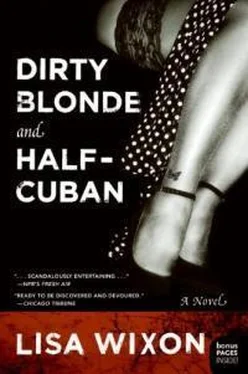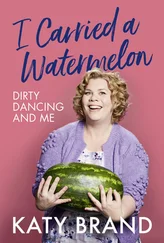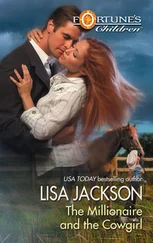Lisa Wixon - Dirty Blonde and Half-Cuban
Здесь есть возможность читать онлайн «Lisa Wixon - Dirty Blonde and Half-Cuban» весь текст электронной книги совершенно бесплатно (целиком полную версию без сокращений). В некоторых случаях можно слушать аудио, скачать через торрент в формате fb2 и присутствует краткое содержание. Жанр: Современная проза, на английском языке. Описание произведения, (предисловие) а так же отзывы посетителей доступны на портале библиотеки ЛибКат.
- Название:Dirty Blonde and Half-Cuban
- Автор:
- Жанр:
- Год:неизвестен
- ISBN:нет данных
- Рейтинг книги:4 / 5. Голосов: 1
-
Избранное:Добавить в избранное
- Отзывы:
-
Ваша оценка:
- 80
- 1
- 2
- 3
- 4
- 5
Dirty Blonde and Half-Cuban: краткое содержание, описание и аннотация
Предлагаем к чтению аннотацию, описание, краткое содержание или предисловие (зависит от того, что написал сам автор книги «Dirty Blonde and Half-Cuban»). Если вы не нашли необходимую информацию о книге — напишите в комментариях, мы постараемся отыскать её.
Dirty Blonde and Half-Cuban — читать онлайн бесплатно полную книгу (весь текст) целиком
Ниже представлен текст книги, разбитый по страницам. Система сохранения места последней прочитанной страницы, позволяет с удобством читать онлайн бесплатно книгу «Dirty Blonde and Half-Cuban», без необходимости каждый раз заново искать на чём Вы остановились. Поставьте закладку, и сможете в любой момент перейти на страницу, на которой закончили чтение.
Интервал:
Закладка:
We’re quiet on the drive, and I don’t feel the usual heady rush of excitement that comes from the anticipation of travel. That, too, seems to have disappeared in Cuba.
“ M’ija,I wish you had met my wife,” says my father, finally speaking.
“Aida…I’d love to.”
“You’ll come back as soon as you can?” His voice is cracking and I, too, am unspeakably sad. It’s only been a few weeks since I met my real father, and I’m hardly ready to leave him. I sneak glances at his profile and try to impress his features to a canvas in my mind, like silver crystals to film.
Two years ago, I can’t help but remember, I was studying my Aunt June’s profile as our taxi took us down this same road.
I double-check for my passport, and it falls open to the stamps I’ve acquired in my travels. I finger the red-ink outline of the Pearl of the Antilles as imprinted 364 days ago, and the visa that expires tonight.
José Antonio, too, studies my passport, and I wonder if he’s thinking of how it transported me and my mother away from him for all those years. Then a palm smacks his forehead.
“Your map,” he says, fumbling in his shirt pocket. “I almost forgot. Camila unpinned it from her wall. She wanted to make sure you kept it.”
Unfolded, the map takes up the taxi’s backseat. My father holds up the western end of Havana and I the eastern end and the sandy playas.My red, girlish stars were drawn over vital places as they became known to me, and I show my father the trail that led to the treasure of finding him. The hospital where I was born (and where I convalesced from the temperament of the Russian, but I don’t tell my father everything); the house with the thieving doctors; the depressed landlady; Camila’s happy home; and, lastly, the sacred pastel casaon Calle M. A smaller star rests on Rafael’s beachside apartment, and my finger lingers over his street.
My mind settles on a memory of my dance lessons with Camila, and how she told me there’s a flow to everything, and if you think too much and feel too little, you miss the important signals. This map has always been in front of me, all along, since the beginning of my search, and at times I’ve stared at it hard, wishing it could magically plot the road to my father. Pinned to the wall above my modest desk, this map had been shining like a beacon during my year in Cuba—even in the darkest days. But I’d chosen to ignore its fundamental importance; to not see the real message it has been conveying all along.
Until this moment.
“ Oye,driver,” I say, suddenly flustered and bright-eyed. “Make a right here.”
“M’ija,”says my father, gently correcting. “Your plane leaves from Terminal 2. Terminal 2 is to the left.”
The map crinkles as I lurch forward in my seat, repeating my demand.
“I know the terminal is to the left,” I say. “But I’m reading the map, and it says to turn to the right.”
66
J osé Antonio andI walk through the Havana botanical gardens.
When the sun reaches its peak, we take cover in the shade of a Japanese pavilion. From there, we admire the arched bridges and carved bonsai trees. In the pond below us, golden-orange koi nip at floating insects.
I’m laughing at one of my father’s jokes when a stunning woman in her late forties approaches. Her hair is black and curly, and she’s dressed in white, with an aquamarine brooch on her chest.
Aida kisses our cheeks and hugs us both tightly.
“Look at you, jabbering away like two West Indian parakeets,” she says, situating herself on my father’s lap.
Many things about Aida remind me of Aunt June, including her lively wit and abiding kindness. When Aida arrived at the airport a few months after I met my father, I knew then I’d made the right choice to stay. Something about her and my father together cemented the idea for me. That I was home, and I belonged.
“We’re having Camila and abuelaover for dinner,” says José Antonio’s wife, leaning back into the summer sun.
“What, no Rafael?” asks José Antonio. Then sternly: “Have you replaced him without asking your father?”
Aida playfully scrunches José Antonio’s cheeks. “You keep out of her love life,” she warns.
“He’ll be there,” I say, rolling my eyes. “He wouldn’t miss Aida’s cooking for a new set of Firestones.”
At my new home is my map of Havana. Sometimes I look it over, to remind me of the journey. To see the stars I’d drawn over the places I knew, like my family’s home in Miramar, and the places I hoped to find. Lately, my fingers have traced the journey from Havana along the oceanfront road that leads to Mariel, and the port where my father began his circuitous journey to find me.
My father speaks often about the Mariel boatlift. His Coast Guard cutter was tied to rafts, and rafts were tied to each other, and the seaworthy and the makeshift held strong together through the canyons of waves that make up the Florida Straits in hurricane season. They were bound by the ropes of determination and hope and might, and plied collectively the uncertain seas before them, strung to one another’s fate, their common aim the shores of Florida. And, they hoped, a life of fulfilled promise.
My map has been covered in new markers, and this time I’ve portrayed the flotillas we’ve created on dry land. On my map I may now chart the Cuban families—bound together by blood, or geography, or the fortune of friendship—that make up neighborly fleets. Ties that connect rafts of people together through rough waters of the unknown, through the journey that is life in modern Cuba. Patiently allowing the interminable winds of change to dictate their direction.
Above all, they are together, we are together, shoring up our strength for whatever may be ahead. Peace? Prosperity? Who knows? Perhaps someday a tear-drenched reunion with our families to the north and south, east and west, like the broken heart of a locket, the pieces coming together again, and creating a final harmony.
I am on such a raft. I am a necessary line in the flotilla, and my weight, my pull, my physicality is an equilibrium. I salve wounds; I salve mine and my father’s, and I am there for those whom I love. And they are there for me.
Each day I grow more convinced this was the destiny my mother turned her back on; a destiny that was hers, perhaps, and certainly, unequivocally, mine.
Part of my duty now is to keep tuned my own moral compass, one that provides space for my life as a jinetera,as well as for holding on to an integrity that allows me to retain my pride.
In Cuba, where anything goes for the sake of the holy dollar, I’ve learned to create my own boundaries.
I’ve watched a proud shop clerk steal from the change owed a tourist. Ten cents here. Twenty cents there. When held accountable, he burns with indignation, and it’s the part directed at his soul he most wrestles with.
I’ve seen a noble family of doctors and engineers let rooms to sex tourists for $20 a night. The kids and grandkids huddle in the basement, listening to the hurricane of a fifty-year-old white Spanish guy pound a nineteen-year-old black Cuban girl in rooms the generations grew up in, gave birth in, honeymooned in, died in. And it continues, the next day scraping up condoms and wrappers and shrugging it off. Laughing—and admirably so—but for how long?
How long, these lamentations?
I don’t know. I don’t understand the vicious stalemate between my American land and my Cuban one. And while the nations wrestle, while they teeter-totter on my hyphen, on the fulcrum of my Cuban-American identity, I can only pray for a quick resolution, so that my people who’ve been scattered around the world may again claim their homeland, and together we may heal.
Читать дальшеИнтервал:
Закладка:
Похожие книги на «Dirty Blonde and Half-Cuban»
Представляем Вашему вниманию похожие книги на «Dirty Blonde and Half-Cuban» списком для выбора. Мы отобрали схожую по названию и смыслу литературу в надежде предоставить читателям больше вариантов отыскать новые, интересные, ещё непрочитанные произведения.
Обсуждение, отзывы о книге «Dirty Blonde and Half-Cuban» и просто собственные мнения читателей. Оставьте ваши комментарии, напишите, что Вы думаете о произведении, его смысле или главных героях. Укажите что конкретно понравилось, а что нет, и почему Вы так считаете.












